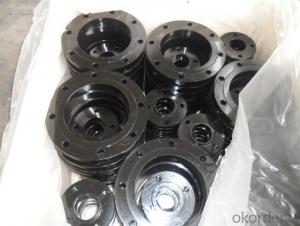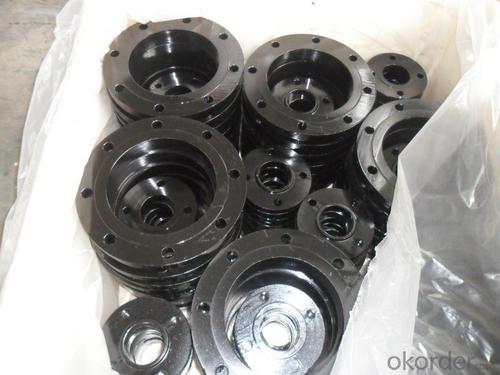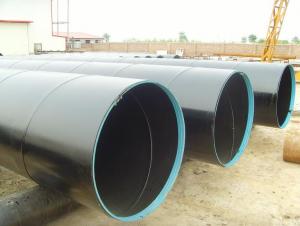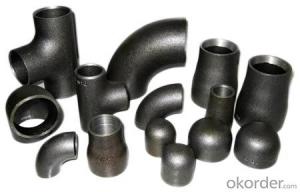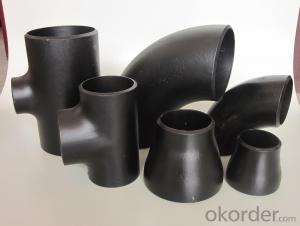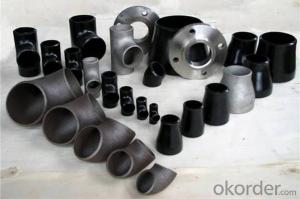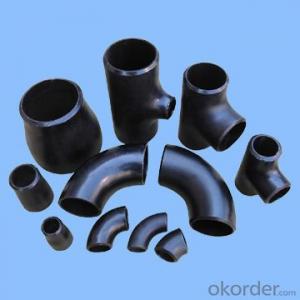CARBON STEEL PIPE FITTINGS ASTM A234 FLANGE 18''-20''
- Loading Port:
- Tianjin
- Payment Terms:
- TT OR LC
- Min Order Qty:
- 5 m.t.
- Supply Capability:
- 30000 m.t./month
OKorder Service Pledge
OKorder Financial Service
You Might Also Like
Specifications
1.we produce seamless steel pipe
2.size:48-219*4.5-45mm
3.ISO 9000 approved
4.Market:south/east Asia,Mid-east,South America
seamless steel pipe
Material J55 K55 N80 L80 P110.etc
Standard ASTM JIS
Usage conveying oil gas ,oil pipe line,pipe material collar,oil nature gas,
Packing wooden cases or wooden pallet ,export standard package
Others:Special design available according to requirement
Anti-corrosion available and high temperature resistence
Delivery time 30days
Payment term T/T L/C
Name | API oil casing pipe | ||||
Out Diameter | Wall thickness | Material | Thread | Length | |
in | mm | ||||
5 1/2 | 139.7mm | 6.20 | J55/K55/N80 | LTC/STC/BTC | R2 |
6.98 | |||||
7.72 | |||||
9.17 | |||||
10.54 | |||||
6 5/8 | 168.28mm | 7.32 | J55/K55/N80 | LTC/STC/BTC | R2 |
8.94 | |||||
10.59 | |||||
12.06 | |||||
12.06 | |||||
8 5/8 | 219.08 | 8.94 | H40 | S/L/B | 9 5/8R2 |
J55/K55 | S/L/B | ||||
10.6 | L80 | L/B | |||
12.7 | L80 C95 | L/B | |||
14.15 | P110 | L/B | |||
9 5/8 | 244.48 | 13.84 | J55 K55 | R2 | |
15.11 | L80 | L/B | |||
10 3/4 | 273.05 | 11.43 | J55 K55 | S/B/E | R2 |
13.84 | P110 | S/B | |||
15.11 | P110 | S/B | |||
11 3/4 | 298.45 | 12.19 | J55 K55 | S/B | R2 |
10.96 | J55 K55 | S/B | |||
13 3/8 | 339.72 | 12.19 | J55 K55 L80 | S/B | R2 |
10.92 | J55 K55 | S/B | |||
13.06 | L80 | S/B | |||
Coupling and thread can be required according to customer requirment
- Q: What is the average lifespan of steel pipes?
- The average lifespan of steel pipes can vary depending on various factors such as the quality of the steel used, the environment in which they are installed, and the maintenance and care they receive. However, on average, well-maintained steel pipes can last anywhere from 50 to 100 years or more.
- Q: How are steel pipes used in the manufacturing of chemical storage tanks?
- Steel pipes are commonly used in the manufacturing of chemical storage tanks as they provide durability, strength, and corrosion resistance. These pipes are utilized for the construction of the tank's framework and support system, ensuring stability and structural integrity. Additionally, steel pipes are often employed for the installation of inlet and outlet connections, allowing for the safe and efficient transfer of chemicals in and out of the tank.
- Q: What are the quality control measures for steel pipe manufacturing?
- The quality control measures for steel pipe manufacturing typically include various stages of inspection and testing, starting from raw material evaluation to the final product. These measures may include checking the chemical composition and mechanical properties of the steel, conducting non-destructive testing such as ultrasonic or magnetic particle inspection, monitoring the dimensions and surface finish of the pipes, and ensuring compliance with relevant industry standards and specifications. Additionally, quality control measures may involve regular maintenance and calibration of equipment, rigorous documentation and traceability of processes, and continuous monitoring and improvement of manufacturing techniques to meet the desired quality standards.
- Q: How are steel pipes transported?
- Steel pipes can be transported using various methods depending on their size, weight, and distance to be covered. The most common modes of transportation for steel pipes include trucks, trains, and ships. For short distances, steel pipes are often transported using trucks. They are loaded onto flatbed trailers or in some cases, specialized pipe trailers that are specifically designed to securely hold and transport pipes. These trucks can easily navigate local roads and highways, making them a convenient option for transporting steel pipes to nearby locations or construction sites. When it comes to long-distance transportation, trains are commonly used. Steel pipes are loaded onto flatcars, which are specifically designed to carry heavy loads. This method is preferred when transporting large quantities of steel pipes over long distances, as trains provide a cost-effective and efficient means of transportation. Moreover, trains are capable of transporting pipes of various lengths and diameters, making them a versatile option. For international shipments or transportation over bodies of water, steel pipes are often transported by ships. Steel pipes can be loaded into shipping containers or onto the deck of a cargo ship. Shipping containers provide protection from weather conditions and ensure the pipes remain secure during transit. Additionally, specialized ships equipped with cranes can handle large and heavy pipes, facilitating the transportation of oversized steel pipes. In some cases, pipelines can also be constructed to transport steel pipes directly from the manufacturing facility to the desired location. This method is commonly used for projects involving oil, gas, or water pipelines. The pipes are laid underground, eliminating the need for separate transportation. Overall, the transportation of steel pipes involves a variety of methods, including trucks, trains, ships, and pipelines, depending on the distance, quantity, and specific requirements of the project. Each method has its advantages and is chosen based on factors such as cost, efficiency, and logistics.
- Q: Can steel pipes be used for conveying gases?
- Yes, steel pipes can be used for conveying gases. Steel pipes are widely used in industrial applications for transporting various gases, including natural gas, propane, and other types of gases. Steel pipes have excellent strength and durability, making them suitable for carrying gases at high pressures and temperatures. Additionally, steel pipes have a high resistance to corrosion, which is crucial when dealing with gases that can be corrosive.
- Q: How are steel pipes used in the manufacturing of food and beverage processing plants?
- Steel pipes are commonly used in food and beverage processing plants for various purposes such as transporting liquids, gases, and steam. They are used to create a network of pipelines that facilitate the movement of raw materials, ingredients, and finished products throughout the manufacturing process. Steel pipes are chosen for their durability, corrosion resistance, and ability to withstand high pressure and temperature conditions, ensuring the safety and efficiency of food and beverage production.
- Q: How are steel pipes used in the manufacturing of ships?
- Steel pipes are used in the manufacturing of ships for various purposes, including structural support, fluid transportation, and ventilation systems. They are commonly used to create the framework of the ship, providing strength and stability. Additionally, steel pipes are used to transport fluids such as water, oil, and gas throughout the vessel. They are also utilized in the ship's ventilation system to ensure proper air circulation and maintain a safe environment for crew members.
- Q: What are the common applications of seamless steel pipes?
- Due to their unique properties, seamless steel pipes are widely used in various industries. Here are some of the most common applications: 1. The oil and gas industry extensively utilizes seamless steel pipes for transporting oil, gas, and other fluids. These pipes are preferred because of their high strength, durability, and resistance to corrosion, making them suitable for harsh environments. 2. Seamless steel pipes are extensively used in construction projects, such as building, bridge, and tunnel construction. They are ideal for structural applications due to their ability to withstand heavy loads and provide excellent strength and stability. 3. The automotive industry relies on seamless steel pipes for manufacturing automotive parts, including exhaust systems, engine components, and hydraulic systems. These pipes offer high strength, reliability, and resistance to heat, making them suitable for demanding automotive applications. 4. Various mechanical and engineering applications benefit from the usage of seamless steel pipes. They are commonly used for carrying fluids, gases, and steam, as well as for transmitting power in machinery and equipment. 5. Power plants extensively utilize seamless steel pipes for transporting steam and hot water. These pipes are capable of withstanding high pressure and temperature, making them ideal for power generation applications. 6. The petrochemical industry heavily relies on seamless steel pipes for transporting chemicals, gases, and liquids. These pipes have excellent resistance to corrosion, which is essential when dealing with hazardous and corrosive substances. 7. The mining industry utilizes seamless steel pipes for various applications, including the transportation of slurry, water, and other mining-related fluids. These pipes offer durability, reliability, and resistance to abrasion, making them suitable for the challenging mining environment. 8. The aerospace industry finds applications for seamless steel pipes in manufacturing aircraft components, such as hydraulic systems, fuel lines, and structural parts. These pipes provide a high strength-to-weight ratio and resistance to extreme temperatures and pressure. Overall, seamless steel pipes play a crucial role in a wide range of industries. Their exceptional properties, including strength, durability, resistance to corrosion and high temperatures, make them an essential component in various industrial processes and infrastructure development.
- Q: What are the different methods of insulating steel pipes?
- There are several methods of insulating steel pipes, including using insulation wraps, foam insulation, fiberglass insulation, and pre-insulated pipe systems. Insulation wraps are typically made of materials like rubber or polyethylene and are wrapped around the pipe to provide thermal insulation. Foam insulation involves applying a layer of foam insulation directly onto the surface of the pipe. Fiberglass insulation is another common method, where fiberglass material is wrapped around the pipe to provide insulation. Pre-insulated pipe systems are complete pipe systems that come with built-in insulation and are ready to be installed. These methods help prevent heat loss or gain in the pipes, maintain temperature control, and prevent condensation.
- Q: How are steel pipes used in the construction of sewer systems?
- Steel pipes are commonly used in the construction of sewer systems due to their durability and strength. These pipes are used to transport sewage and wastewater from households and businesses to treatment plants or disposal sites. They are resistant to corrosion and can withstand high pressure, making them ideal for underground installations. Additionally, steel pipes can be manufactured in various sizes and lengths, allowing for efficient and cost-effective installation in sewer infrastructure.
Send your message to us
CARBON STEEL PIPE FITTINGS ASTM A234 FLANGE 18''-20''
- Loading Port:
- Tianjin
- Payment Terms:
- TT OR LC
- Min Order Qty:
- 5 m.t.
- Supply Capability:
- 30000 m.t./month
OKorder Service Pledge
OKorder Financial Service
Similar products
Hot products
Hot Searches
Related keywords
